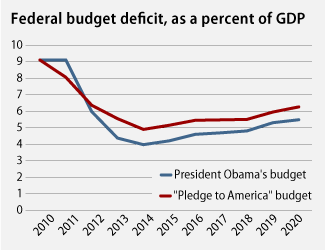The Pledge to Increase the Deficit
The Center for American Progress’ Michael Ettlinger and Michael Linden do quick work dismantling the GOP’s Pledge to America, a governing platform released with
Jul 31, 202059.6K Shares4.5M Views
The Center for American Progress’ Michael Ettlinger and Michael Linden do quick workdismantling the GOP’s Pledge to America, a governing platform released with great fanfare but to little applause last week. Lo and behold, cutting taxes without cutting spending leads to yawning deficits and a fatter national debt.
“„The “Pledge to America” budget would mean $11.1 trillion in deficits over the next 10 years. By 2020, the federal budget deficit would be 6.3 percent of gross domestic product, the federal debt would exceed 93 percent of GDP, and interest payments on the debt would be more than $1 trillion a year. The budget deficit would be about $200 billion larger in 2020 under the “Pledge to America” plan than it would be under President Barack Obama’s budget, and over the next 10 years deficits would be $1.5 trillion higher than under the president’s budget.
“„The substantial increase in deficits under the “Pledge to America” budget are due to the significant tax cuts that come from extending all expiring tax provisions and the implementation of several new tax cuts. Altogether, tax revenues under the “Pledge to America” plan would average 16.7 percent of GDP. During the last period the federal government ran balanced budgets revenues averaged 20 percent of GDP.
“„The document claims that these cuts will be offset by spending reductions, but their proposals for these reductions add up to significantly less than their revenue cuts. The vast bulk of these spending cuts are achieved through what are described as “hard caps,” but they provide little detail as to what programs would be cut.
“„The “Pledge to America” also includes a repeal of the Affordable Care Act. But since the ACA reduces deficits over the next 10 years, repealing it increases the deficit as well.

Camilo Wood
Reviewer
Camilo Wood has over two decades of experience as a writer and journalist, specializing in finance and economics. With a degree in Economics and a background in financial research and analysis, Camilo brings a wealth of knowledge and expertise to his writing.
Throughout his career, Camilo has contributed to numerous publications, covering a wide range of topics such as global economic trends, investment strategies, and market analysis. His articles are recognized for their insightful analysis and clear explanations, making complex financial concepts accessible to readers.
Camilo's experience includes working in roles related to financial reporting, analysis, and commentary, allowing him to provide readers with accurate and trustworthy information. His dedication to journalistic integrity and commitment to delivering high-quality content make him a trusted voice in the fields of finance and journalism.
Latest Articles
Popular Articles
